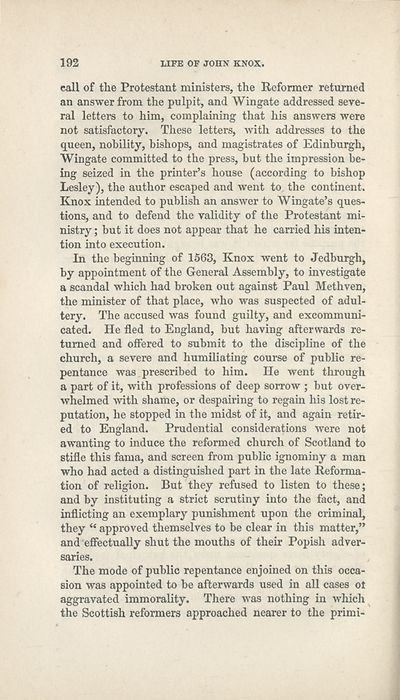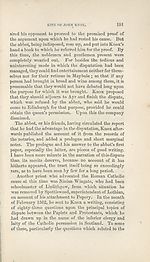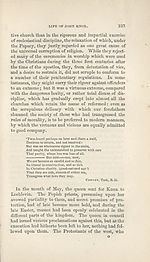Download files
Complete book:
Individual page:
Thumbnail gallery: Grid view | List view

192
LIFE OF JOHN KNOX.
call of the Protestant ministers, the Reformer returned
an answer from the pulpit, and Wingate addressed seve¬
ral letters to him, complaining that his answers were
not satisfactory. These letters, with addresses to the
queen, nobility, bishops, and magistrates of Edinburgh,
Wingate committed to the press, but the impression be¬
ing seized in the printer’s house (according to bishop
Lesley), the author escaped and went to the continent.
Knox intended to publish an answer to Wingate’s ques¬
tions, and to defend the validity of the Protestant mi¬
nistry ; but it does not appear that he carried his inten¬
tion into execution.
In the beginning of 1563, Knox went to Jedburgh,
by appointment of the General Assembly, to investigate
a scandal which had broken out against Paul Methven,
the minister of that place, who was suspected of adul¬
tery. The accused was found guilty, and excommuni¬
cated. He fled to England, hut having afterwards re¬
turned and offered to submit to the discipline of the
church, a severe and humiliating course of public re¬
pentance was prescribed to him. He went through
a part of it, with professions of deep sorrow ; but over¬
whelmed with shame, or despairing to regain his lost re¬
putation, he stopped in the midst of it, and again retir¬
ed to England. Prudential considerations were not
awanting to induce the reformed church of Scotland to
stifle this fama, and screen from public ignominy a man
who had acted a distinguished part in the late Reforma¬
tion of religion. But they refused to listen to these;
and by instituting a strict scrutiny into the fact, and
inflicting an exemplary punishment upon the criminal,
they “ approved themselves to be clear in this matter,”
and effectually shut the mouths of their Popish adver¬
saries.
The mode of public repentance enjoined on this occa¬
sion was appointed to be afterwards used in all cases ot
aggravated immorality. There was nothing in which
the Scottish reformers approached nearer to the primi-
LIFE OF JOHN KNOX.
call of the Protestant ministers, the Reformer returned
an answer from the pulpit, and Wingate addressed seve¬
ral letters to him, complaining that his answers were
not satisfactory. These letters, with addresses to the
queen, nobility, bishops, and magistrates of Edinburgh,
Wingate committed to the press, but the impression be¬
ing seized in the printer’s house (according to bishop
Lesley), the author escaped and went to the continent.
Knox intended to publish an answer to Wingate’s ques¬
tions, and to defend the validity of the Protestant mi¬
nistry ; but it does not appear that he carried his inten¬
tion into execution.
In the beginning of 1563, Knox went to Jedburgh,
by appointment of the General Assembly, to investigate
a scandal which had broken out against Paul Methven,
the minister of that place, who was suspected of adul¬
tery. The accused was found guilty, and excommuni¬
cated. He fled to England, hut having afterwards re¬
turned and offered to submit to the discipline of the
church, a severe and humiliating course of public re¬
pentance was prescribed to him. He went through
a part of it, with professions of deep sorrow ; but over¬
whelmed with shame, or despairing to regain his lost re¬
putation, he stopped in the midst of it, and again retir¬
ed to England. Prudential considerations were not
awanting to induce the reformed church of Scotland to
stifle this fama, and screen from public ignominy a man
who had acted a distinguished part in the late Reforma¬
tion of religion. But they refused to listen to these;
and by instituting a strict scrutiny into the fact, and
inflicting an exemplary punishment upon the criminal,
they “ approved themselves to be clear in this matter,”
and effectually shut the mouths of their Popish adver¬
saries.
The mode of public repentance enjoined on this occa¬
sion was appointed to be afterwards used in all cases ot
aggravated immorality. There was nothing in which
the Scottish reformers approached nearer to the primi-
Set display mode to:
![]() Universal Viewer |
Universal Viewer | ![]() Mirador |
Large image | Transcription
Mirador |
Large image | Transcription
| Antiquarian books of Scotland > Scotland/Scots > Life of John Knox ; and, The life of Alexander Henderson > (210) |
|---|
| Permanent URL | https://digital.nls.uk/131834824 |
|---|
| Description | Thousands of printed books from the Antiquarian Books of Scotland collection which dates from 1641 to the 1980s. The collection consists of 14,800 books which were published in Scotland or have a Scottish connection, e.g. through the author, printer or owner. Subjects covered include sport, education, diseases, adventure, occupations, Jacobites, politics and religion. Among the 29 languages represented are English, Gaelic, Italian, French, Russian and Swedish. |
|---|

